Making water from snow
...literally, and perhaps figuratively, as far as distillation metaphors go
My thoughts today are like a braided river, each one swirling and colliding and mapping over the others. I got to see such a river from the plane last week on my way back from Nome. It was the Yukon, the massive artery that crosses all of Alaska. I had just finished reading Margi Murie’s memoir (“biographical novel”) Two in the Far North, about her adventures in the arctic wilderness. Like in real life, the Yukon features prominently.
This post feels a bit like that river. Although I hope my various thoughts will meet at the same place downstream, it might take time to get there. Paddle along as you will.
A solo mid-week retreat
Yesterday I found myself sitting on a snow-covered bench feeding ice chips into the narrow mouth of a collapsible water container. I was alone on the deck of a cabin overlooking Resurrection Bay on what was supposed to be a mini self-care retreat: an “energetic spring cleaning,”1 if you will.
I had reserved this public use cabin—one of many throughout the state—hoping to hit the reset button. To nap and read by the stove, to make simple camp meals. To sip tea and gaze across the glorious bay. To take walks with Osiris the dog.
Southcentral Alaska has had historic snow levels this year—a fact that greets me every morning as a pile in the yard. Yet when I decided to spend two nights at a cabin a few hours away but in an area with even higher precipitation, I somehow forgot about the snow.
The cabin I went to doesn’t have its own water source. I’d been in the area several times during summer and assumed, wrongly, that I’d find streams or unfrozen parts of a pond even this time of year. So I opted not to bring any kind of pot or large container that would be useful, perhaps even necessary, if I needed to melt snow for my drinking water.2 Instead, I packed only a lightweight water purifier designed for dipping into ponds and streams. Upon arriving at the cabin and consuming the little water I’d brought (including a vitally juicy apple), I had to figure something out.
Feeding ice chips into the filter bag was step five of my improvised seven-step process. The full process went like this: first, I went outside and collected snow in solo cups left in the cabin by a prior occupant (thank you, party kids). Then I compressed that snow into my tiny Jetboil water heater and boiled it while also stuffing and compressing more snow into the one clean Ziploc bag I’d thought to bring. Next, I poured the (small amount of) boiling water into the Ziploc snow bag and mashed it from the outside, making what I call “ice chips.” Then I fed the ice chips into the bag of my water purifier and added more boiled snow-water to that. Because each cycle yielded only a few milliliters of water, I repeated the process until I’d filled the three-liter filtration bag. Finally, after filtering the water from the bag into my water containers, I had enough to last me until I left the following morning.
Welcome to my day of rest and relaxation.

The funny part about all this was, I could have gotten bottled water. The cabin is only a few miles from the town of Seward and I had cell service: this was no Bear Grylls situation. I even encountered a well-meaning hiker who suggested that I post something on a Facebook group and ask a snowmachiner to bring me out a gallon.
Unsurprisingly, I didn’t want to go back to town or rely on my phone to save me. It had been a while since I’d spent a night alone in the woods—this was a chance to prove I could resource myself even outside of my typical environment. After all, there was plenty of snow, and I had plenty of time. I wanted to navigate the simple yet consequential problems of providing for my basic needs with what I had.
The ice chip process was tedious, and my fingers stung from the cold. But when I tasted the final product—truly distilled water, I called it, given the seven levels of condensation it required—it was more real, more hydrating than any of the countless liters I might glug while sitting at my desk.
After my own tiny water shortage, after seeing the cost (in time, in fingertips, in boiling fuel) of each liter of water, I savored my sips. I wasn’t joking about the apple either: its hydration power was wild. I thanked it with each bite. I became aware of its liquid content, in the water its membranes hold, like never before.
In Braiding Sweetgrass, Robin Wall Kimmerer shares Indigenous environmental knowledge alongside sometimes conflicting Western practices. The chapter I just finished discusses how Kimmerer was raised to see natural resources as gifts of the earth. In that model, when humans choose to accept nature’s gifts—water, fruit, meat—we take on a responsibility to care for and return those gifts back to the land.
She contrasts such a “gift” model with the market model of how we live in modern Western society: “Something is broken when the food comes on a Styrofoam tray wrapped in slippery plastic, a carcass of a being whose only chance at life was a cramped cage. That is not a gift of life; it is a theft.”
It’s embarrassing to reflect on my day of making snow into water as even a taste of what living in a gifting economy would be like. I feel like a poser, another Henry David Thoreau (and no, I don’t think that comparison could be in a “good way”).3 I’m so entwined in modern American life, the “market” model of interacting with the world, that it’s hard to even glimpse the alternative.
The thing is: I have glimpsed it, countless times. It feels like a pulse of life. A settling. It’s falling asleep on three different rocks over the course of an afternoon by the stream. It’s a place where plants can talk, and where one’s responsibilities matter just as much as one’s rights. It’s an acknowledgment in my bones that I am indeed connected to everything around me.
Perhaps surprisingly, despite the ice chips, my time at the cabin left me recharged. By having to pay attention to my immediate environment and think about how I could meet my needs within it, I let go of some of the noise, the energetic blocks.
I found power in resourcing myself with what was there. In being creative. If that were my whole world, I think I’d be pretty fulfilled. Content, even—like the Finns.
There would be a lot I wouldn't have in such a world, including this newsletter. I’d have to give a lot up. Now that I’m back home I’m enjoying the comforts this life affords: my couch, unlimited tap water, and takeout food from plastic containers.
But as much as I love cappuccinos and the internet and podcasts and nonsensical trends like “slow fashion,” the alternative life feels more true. It’s similar to knowing what the right decision is, even though carrying out that decision is so hard you’d rather delude yourself a little while longer. That’s pretty much what humans are doing with climate change, and with our broken world in general.
There’s a quote from Fleischman Is in Trouble that I think about a lot: when Rachel, played in the miniseries by Claire Danes, says she “never stood a chance” in her marriage. Reading each news headline that prioritizes profit over living beings makes me feel the same way about our society: that we never stood a chance.
Now I’m having deja vu. I’m remembering a discussion a while back about what it would really take to live that other, gift-model of life. I’m remembering countless such discussions, topics and people and hopes intertwining and supporting one another, each path a separate strand of the river.
Being in company with myself, my (borrowed) dog, and our surroundings yesterday reminds me that something else is possible. I was given these gifts and must figure out how to return them. Maybe the best thing to do, for now, is to keep that glimmer of another world alive.
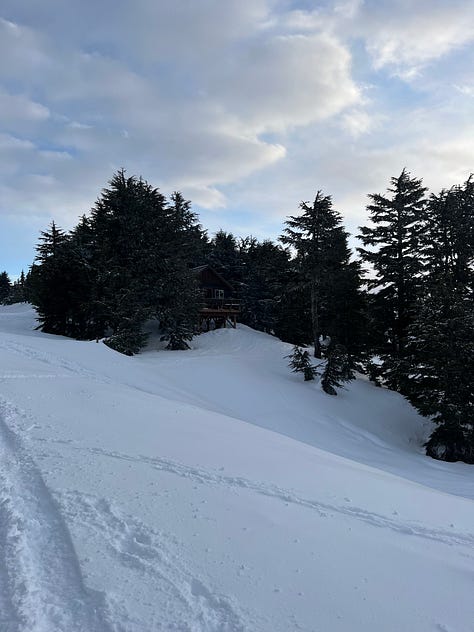
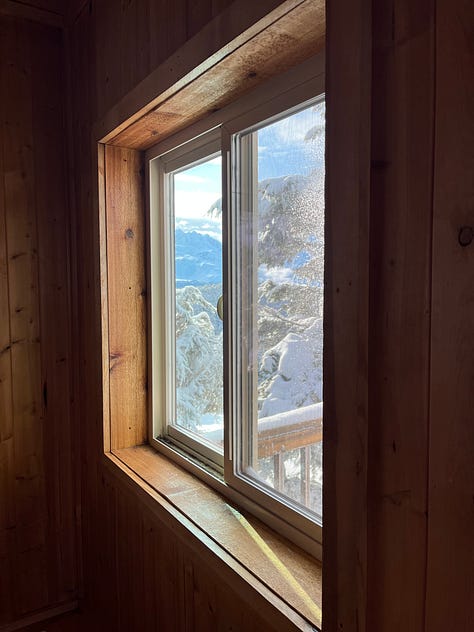
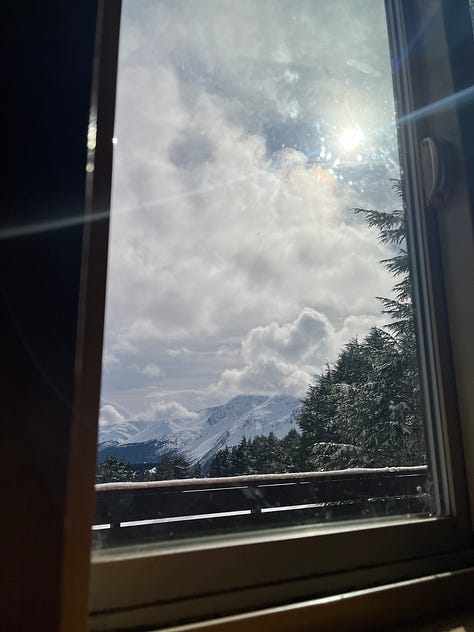

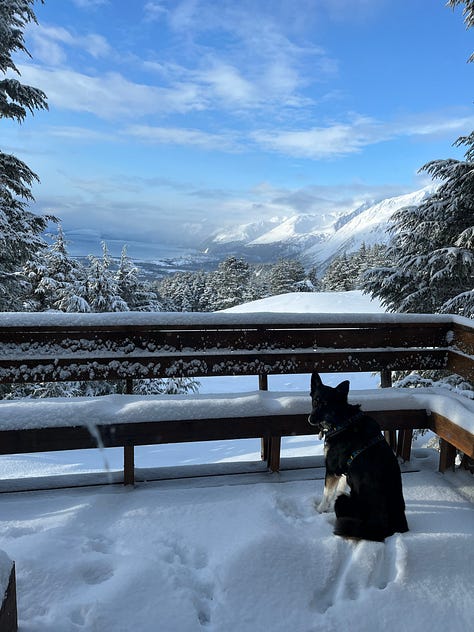
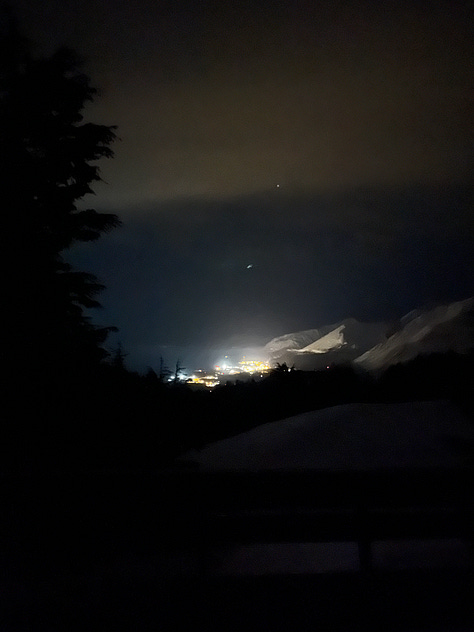
As always, thanks for reading. -Julia
Credit to Sarah Faith Gottesdiener for this term.
I don’t know the actual stats except that it takes a “surprising amount of snow to make even a liter of water” - per this guy.
But please listen to Lily and Steven’s Celebrity Book Club episode about him if you haven’t already—death by laughter.


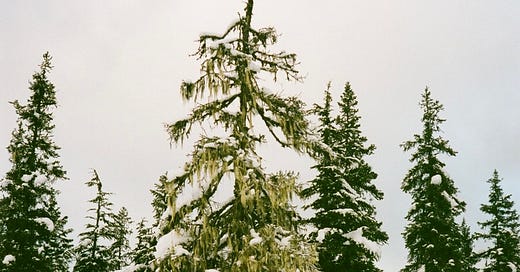


"It’s similar to knowing what the right decision is, even though carrying out that decision is so hard you’d rather delude yourself a little while longer." -- love this.
Julia- The fact that you could've gotten bottled water and yet ended up with turning snow into water is why I enjoyed this read. So many times nature and life condition defaults us (aka water turning into snow naturally). But takes purpose, perception, and probably perseverance to do the opposite. I love how you exhibited this. Cheers, -Thalia